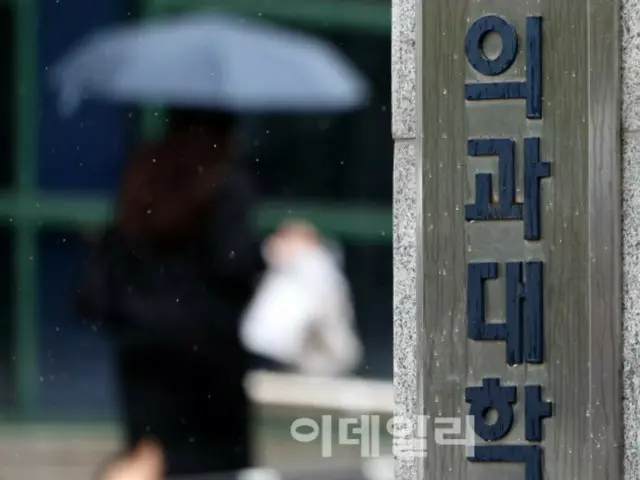According to the Ministry of Education on the 11th, of the total 19,475 medical students, 8,305 students, or 42.6%, will be held back a year. Meanwhile, 46% will be expelled.
Analysts have also found that even at medical schools, where school rules state that students who are absent without permission for more than a month are expelled, students have avoided expulsion by returning at the end of the semester.
However, if students continue to refuse classes through the second semester, the number of students who will be expelled at the end of the year could increase, as medical schools normally expel students after receiving three "grade warnings."
According to the Ministry of Education, 3,027 medical students, or 15.5% of all students, were classified as "grade warning" students in the first semester. The number of students who applied to take only one course to avoid repeating the year was also 1,389 (7.1%).
The Ministry of Education said, "6,708 medical students, or 34.4% of all students, will be able to attend classes in the first semester. Among those who are expected to receive a grade warning and those taking one subject, preparatory students will be able to attend classes in the second semester.
If this is applied, 1,626 first-year students will have to repeat the year, 3,058 new students next year, and some students will be subject to a grade warning.
Including the above, a maximum of 6,900 students will be in the same year next year. This figure assumes that some students who applied to take one subject will also repeat the year.
Although this is less than the expected number of students who could take one year off per year, it is still considered a burden on medical school education.
The ministry said, "Taking into consideration the educational conditions of each university, first-year students will be given priority at a level where they can receive an education."
"We plan to hold frequent discussions with universities so that students can continue to receive their education," he said. For students in preparatory courses that focus on theory and liberal arts classes at universities, the university will provide them with large-scale lectures, seasonal semesters, and online classes.
On the other hand, securing hospitals for undergraduate students' clinical training is pointed out as an issue that the government and universities must resolve in the future. Currently, the clinical training quotas of 40 medical schools nationwide are about
According to the Ministry of Education, 2,898 students in their third and fourth year of undergraduate studies in the first semester of this year will be held back, and 1,700 students will be in their third and fourth year of undergraduate studies next year.
The number of students eligible for clinical training is expected to increase significantly, including undergraduate students who will be returning to school after failing to attend school. The Ministry of Education said, "Once the decision is made on whether to hold back a year or to be expelled, we will work with universities to ensure that students who return can receive their education normally."
The Korea Medical College and Graduate School Association, which represents the presidents of 40 medical schools nationwide, also announced that "40 medical schools nationwide will focus on educating students who have returned to their studies."
did.
2025/05/11 15:23 KST
Copyrights(C) Edaily wowkorea.jp 91

